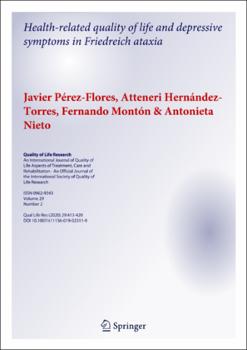Health-related quality of life and depressive symptoms in Friedreich Ataxia
Fecha
2020Resumen
Purpose Friedreich ataxia (FRDA) is a chronic, progressive and highly disabling cerebellar degenerative disease. Despite
this, little attention has been paid to the health-related quality of life (HRQOL) in this disease. The aim of the present study
was to assess FRDA patients’ perception of HRQOL and to determine the infuence of depression, and demographic and
clinical variables.
Method The sample consisted of 62 patients with genetically confrmed FRDA. The SF-36 Health Survey was used to assess
HRQOL. Depressive symptoms were evaluated with the Beck Depression Inventory-II.
Results FRDA patients’ mean scores were signifcantly lower than the values for the Spanish population in all SF36 dimensions. Average z scores ranged from −5.5 in physical functioning to −0.48 in mental health. Age and clinical variables
were signifcant predictors of HRQOL in only several dimensions, whereas BDI scores were able to predict a signifcant
percentage of variance in all SF36 dimensions, except physical functioning.
Conclusions Our study demonstrates the high impact of Friedreich ataxia on quality of life. This impact does not only occur
in those aspects most related to motor disability but it is also present in non-motor dimensions. Depressive symptomatology
is the most relevant variable for predicting quality of life





